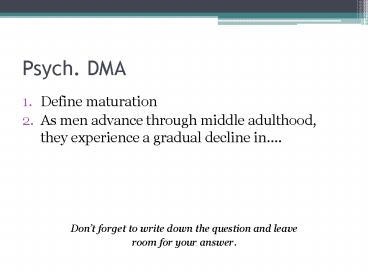Psych. DMA - PowerPoint PPT Presentation
Title:
Psych. DMA
Description:
Psych. DMA Define maturation As men advance through middle adulthood, they experience a gradual decline in . Don t forget to write down the question and leave – PowerPoint PPT presentation
Number of Views:89
Avg rating:3.0/5.0
Title: Psych. DMA
1
Psych. DMA
- Define maturation
- As men advance through middle adulthood, they
experience a gradual decline in. - Dont forget to write down the question and leave
- room for your answer.
2
Todays Agenda
- DMA
- Reminders
- Piaget
- Issues
- Child Dev.
- Harlow
- Ainsworth
- Freud
- Homework
- Chap. 4 Test Dec. 1st
- Chap. 4 Notes Dec.1st
- FRQs 3 due Wednesday
- Self-Experiment due Monday, Nov. 28th
- Summative Test Dec. 6th
- Chap. 4 Review Session Nov. 29th, 215-245,
Wheelers room
3
Please bring your chapter notes on Wednesday
- You may have time to work on them ?
4
Problems with Piaget
5
Big thought
- Development is NOT learning.
6
Issues with Piaget's study
- Piaget studied his own kids. (Not really an issue
- his findings were applicable and are still
used.) - Separate stages - distinct stages may not be
accurate. - Ages in stages may also be off.
7
However, Piaget is still the basis of experiments.
- Shinskey Munakata (2003) found infants had
advantage searching in the dark vs. searching
under a thing in the light.
8
- One explanation - the appearance of the coverlet
interferes with baby's new, tenuous ability of
representing an object mentally. - Another explanation is evolutionary. Searching
for things in the dark is more evolutionarily
advantageous than for things hidden in the light.
9
- Scher, Amir Tirsh (2000) findings indicate that
babies with more advanced grasp of object
permanence experienced significantly fewer sleep
disturbances than those with lower levels of
object concept. - (In other words - you sleep better when you know
where your stuff is.)
10
Social Development
- Stranger Anxiety
- fear of strangers that infants commonly display
- beginning by about 8 months of age
- Attachment
- an emotional tie with another person
- shown in young children by their seeking
closeness to the caregiver and displaying
distress on separation
11
Social Development
- Harlows Surrogate Mother Experiments
- Monkeys preferred contact with the comfortable
cloth mother, even while feeding from the
nourishing wire mother - Introduction
- Scaring the monkey
12
Social Development
- Critical Period
- an optimal period shortly after birth when an
organisms exposure to certain stimuli or
experiences produces proper development - Imprinting
- the process by which certain animals form
attachments during a critical period very early
in life
13
Social Development
- Monkeys raised by artificial mothers were
terror-stricken when placed in strange situations
without their surrogate mothers.
14
Mary Ainsworth
- Researched what infants would do when placed in
new situations (without parents)
15
Mary Ainsworth
- Findings
- Secure attachment
- Infant was confident to explore the environment
(when parent was present) - Became distressed when parents left.
- 66
- Avoidant attachment
- Resist being held by parents will explore
environment. - Do not go to parents for comfort when they return
- 21
16
Mary Ainsworth
- Findings
- Anxious/ambivalent attachment
- Ambivalent reaction to parents
- May show extreme stress (when parents leave)
- Resist being comforted by parents
- 12
17
Freud's Stages of Development
18
Definition of the Unconscious
- According to Freud
- A reservoir of mostly unacceptable thoughts,
wishes, and feelings.
- According to Contemporary Psychology
- Information processing of which we are unaware.
19
Freud's concept of personality says
- Human personality (including emotions and
strivings) arises from a conflict between our
aggressive, pleasure-seeking biological impulses
and the internalized social restraints against
them. - Personality is the result of our efforts to
resolve the conflict.
20
This conflict centers on 3 systems
21
Id
- Urge to satisfy basic drives
- Survival
- Reproduction
- Aggression
- Major factor of the Id is the Pleasure Principle
- if the id is not restrained by reality, it
seeks immediate gratification.
22
Superego
- Moral imperatives of what is right.
- Voice of conscious forces the ego to think about
how things OUGHT TO BE. - Basically the Superego is fighting the Id and
therefore the Ego must balance.
23
Ego
- Seeks to gratify the Id's impulses in realistic
ways. - (Sometimes this is referred to as the Reality
Principle.) - Contains partly conscious perceptions, thoughts,
judgments, and memories.
24
(No Transcript)
25
Ok, Wheeler, what the heck does this have to do
with kids?
26
Freud's Psychosexual stages of Development
- Basically, Freud separated out development via
the Id's focuses. - When the Id's pleasure seeking energies focus on
the distinct pleasure sensitive area of the body
(i.e. erogenous zones) a different developmental
stage is reached.
27
Stage Focus
Oral (0-18 months) Pleasure centers on mouth sucking, biting, etc
Anal (18-36 months) Bowel and bladder elimination coping with demands for control.
Phallic (3-6 years) Genitals. Coping with incestuous feelings and gender identity.
Latency (6 years - puberty) Dormant sexual feelings
Genital (Puberty on) Maturation of sexual interests
28
Reading Assignment
- Please read page 577.
- Begin at Personality Structure.
- Read through page 579 and stop at Defense
Mechanisms.































